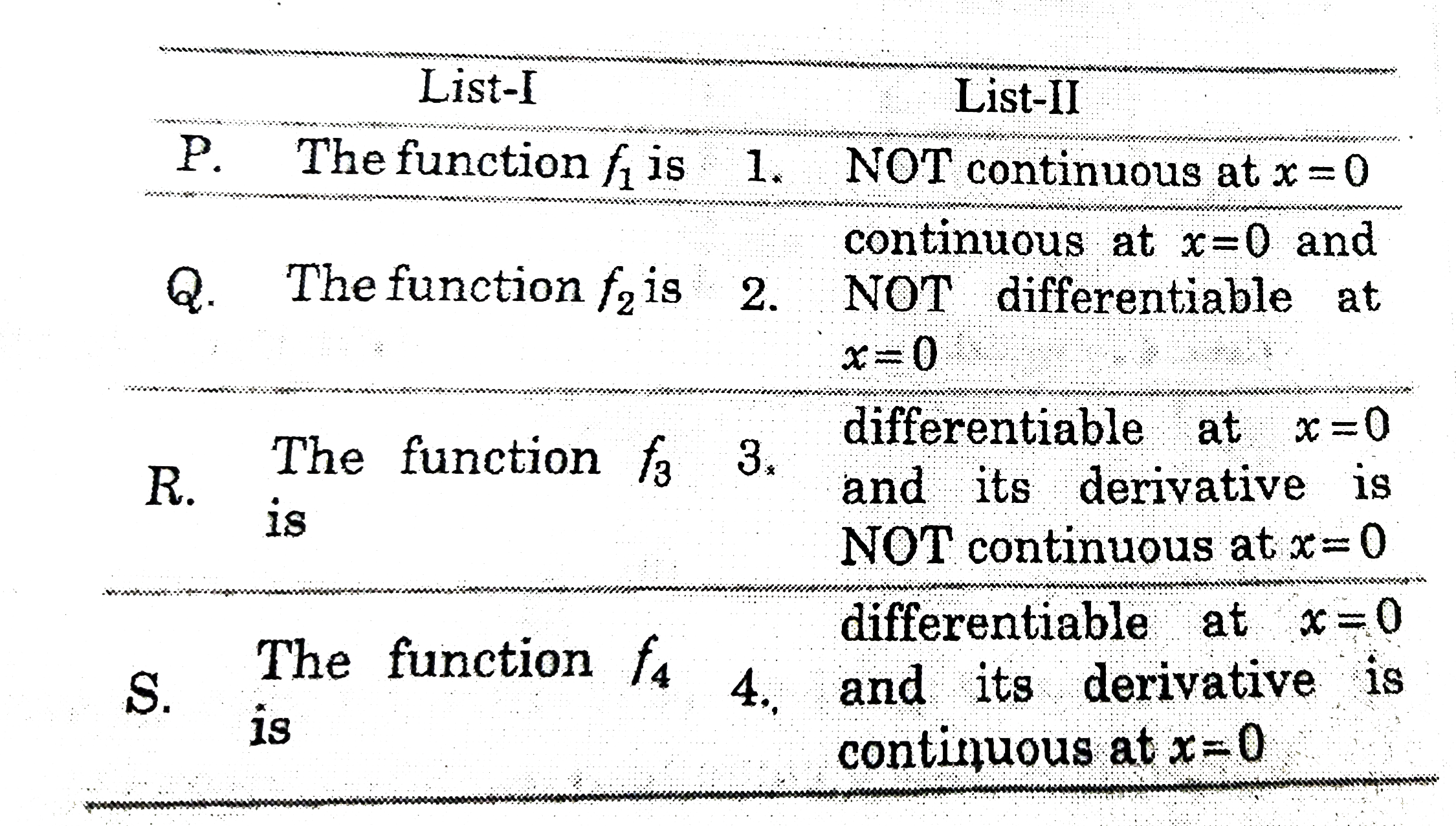Let be functions defined by
(i) ,
(ii)
trigonometric function x assumes values in ,
(iii) , where for , [t] denotes the greatest integer less than or equal to t,
(iv)

A
B
C
D
Text Solution
The correct Answer is:D
(i) Given,
is continuous at x = 0
Now,
At x = 0
does not exists.
is not differential at x = 0
Hence, option (2) for P.
(ii) Given,
Clearly, is not continuous at x = 0 .
Option (1) for Q.
(iii) Given, , where [] is G.I.F. and
It is given
It is differentiable and continuous at x = 0 .
Option (4) for R
(iv) Given,
Now,
For
Thus,
Again,
does not exists.
Since, does not exists.
Hence, f'(x) is not continuous at x = 0.
Option (3) for S.
|
Topper's Solved these Questions
- LIMIT,CONTINUITY AND DIFFERENTIABILITY BOOK - IIT JEE PREVIOUS YEARCHAPTER - LIMIT,CONTINUITY AND DIFFERENTIABILITY EXERCISE - Continuity in a Domain (Objective Question I )
7 Videos
- LIMIT,CONTINUITY AND DIFFERENTIABILITY BOOK - IIT JEE PREVIOUS YEARCHAPTER - LIMIT,CONTINUITY AND DIFFERENTIABILITY EXERCISE - Continuity in a Domain (Objective Question II )
2 Videos
- LIMIT,CONTINUITY AND DIFFERENTIABILITY BOOK - IIT JEE PREVIOUS YEARCHAPTER - LIMIT,CONTINUITY AND DIFFERENTIABILITY EXERCISE - (Analytical & Descriptive Questions)
5 Videos
- JEE MAINSBOOK - IIT JEE PREVIOUS YEARCHAPTER - JEE MAINSEXERCISE - All Questions
1 Videos
- MATRICES AND DETERMINANTSBOOK - IIT JEE PREVIOUS YEARCHAPTER - MATRICES AND DETERMINANTSEXERCISE - SOLVING SYSTEM OF EQUATIONS (INTEGER ANSWER TYPE QUESTION)
2 Videos
Similar Questions
Knowledge Check
A function f:R→R is given by f(x)={x4(2+sin1x)x≠00x=0, then
Af has a continous derivative ∀x∈RBf is a bounded functionCf has an global minimum at x=0Df" is continous ∀x∈RA function f:R→R is given by f(x)={x4(2+sin1x)x≠00x=0, then
Af has a continous derivative ∀x∈RBf is a bounded functionCf has an global minimum at x=0Df" is continous ∀x∈R
A function f:R→R is given by f(x)={x4(2+sin1x)x≠00x=0, then
View Solutionlet f:R→R be a continuous function defined by f(x)=1ex+2e−x
View SolutionIf f:R→R be the function defined by f(x)=sin(3x+2)∀x∈R. Then, f is invertible.
View SolutionIf f:R→R be the function defined by f(x)=sin(3x+2)∀x∈R. Then, f is invertible.
View SolutionLet f : R → R be a function defined by f ( x ) = 2 x − 5 ∀ x ∈ R . Then Write f−1.
View SolutionLet f : R → R be a function defined by f ( x ) = 2 x − 5 ∀ x ∈ R . Then Write f−1.
View Solution
